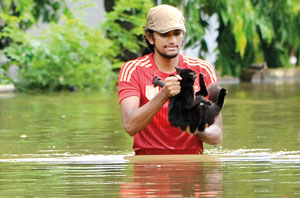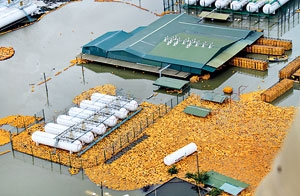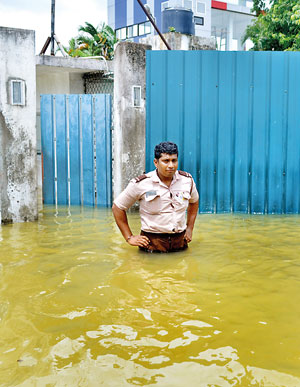Technology plays vital role in flood relief efforts
View(s):
Wading to safety with a cat. Pix by Indika Handuwala and Anuradha Bandara
Economic activity has been adversely affected by the heavy rains accompanied by floods hampering paddy cultivations in Anuradhapura, Kurunegala, Batticaloa, Ampara, Polonnaruwa, and Trincomalee.
But a proper assessment on crop damages has not been made so far as, government officials said as priority was being given to provide relief to the affected people, Agriculture Ministry officials said according to unofficial estimates and available information at present, around 75,000 hectares of paddy fields have been destroyed.
A proper assessment would be made after the receding of flood waters and the completion of the resettlement of the displaced. “Till then we cannot come to a conclusion on the exact damages caused to paddy cultivations,” Prabath Witharana, Engineer (water management )Agrarian Development Department told the Business Times.
He said that 31 irrigation tanks countrywide were damaged and the Kurunegala and Anuradhapura areas were the worst hit by floods damaging 16 and 6 tanks, respectively.
Meanwhile the Planters Association (PA), representing regional plantation companies, said 14 bodies had been recovered while 16 others were missing at Kalupahana estate at Bulathkohupitiya in Avisawella district due to a 600-foot earthslip that swallowed 10 ‘line-rooms’ (small huts). The dead included an 8-month child.
The number of families displaced is 80 with the total head count – 200 who are being looked after by estate authorities and state agencies at Seelananda Sinhala Vidyalaya, Bulathkohupitiya.
Perhaps the biggest plus point was the manner in which start-up companies pitched in to help victims.
Lahiru Pathmalal, founder CEO of Takas.lk, an e-commerce web, said they partnered with FloodRelief Lanka to give aid to those who were displaced in the western province.

Empty gas tanks floating
A conversation on social media between members of the start-up community went like this:
A: “Yamu and Roar did excellent posts and videos outlining the scale of the disaster and providing valuable info to people on how they can get involved. Social media in general has enabled more involvement by the general public, so much so that both Wellampitiya and Aranayake are reporting over supply of food items.”
B: “There’s http://srilankafloods2016.com/ – which uses a simple google sheet strategy to identify needs:
If you WANT TO HELP out, click here to find the people in need – https://goo.gl/HuUALI – you can add your name and contact number against the requirement you wish to fulfil. Many thanks in advance.
Also, I must say that there has been a failing in not using ICTs and mapping to better coordinate relief / response efforts. For example, in many disasters elsewhere – mapping platforms are utilised – often called crisis maps – here’s a good background article: http://news.nationalgeographic.com/2015/05/150501-nepal-crisis-mapping-disaster-relief-earthquake/ … Perhaps there is the use of maps and I just haven’t seen it.
In social media, while it is powerful, I saw someone post a message saying to take antibiotics if exposed to flood water, because of the possibility of disease and infections.. … I am not sure if social media should advise people to take or not take antibiotics!

Security guard outside an office
The last thing to point out is that like most disasters, there’s a blip in the attention levels. But the hard work will commence a week or so after the disaster. The role/use of ICTs/ digital during the post disaster period will also be interested to consider.
**
C: Sri Lanka Help while small, only started last afternoon (Thursday) and has aggregated a lot of info via streams/hashtags and people have been using it quite well
**
D: (from www.payable.lk)
Joint efforts of PAYable Quickie and Red Cross. Quickie will pick up cash /credit /debit donations using PAYable devices. We will collectively absorb all the delivery /pick fees charges and bank fees. So 100 per cent of even Credit card donations will go towards the relief efforts of the Red Cross. We feel support and relief efforts will need to continue weeks and months ahead
**
E: (from readme.lk)
The tech industry is also doing its part in helping relief efforts, especially in getting much-needed supplies to flood affected areas.
What supplies are needed at the moment? The list includes: Dry rations (dhal, rice, sugar, tinned fish, and biscuits) baby food items (cereal) baby milk powder, sanitary pads, towels, cooking utensils, blankets, mats, water bottles, bed sheets, panadol / paracetamol / sidhalepa Clothes – large t-shirts / sarongs / skirts, milk powder / sugar / tea
**
F: (PickMe Flood Relief)
PickMe formed a partnership with EBC Sathkaaraya to launch a Flood Relief service to distribute relief supplies. Just open up your app and slide the vehicle bar below till you see Flood Aid and SOS. If you have supplies that you wish to donate to flood victims, you can use the Flood Aid feature to have PickMe come and collect your supplies, which shall then be donated to flood victims. Furthermore, if you know anyone that needs rescuing, use the SOS feature and PickMe will have a boat sent by the Navy to ensure they are rescued.


